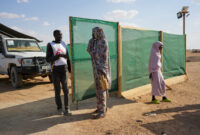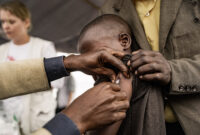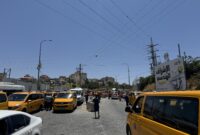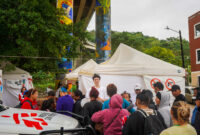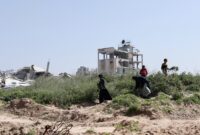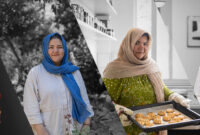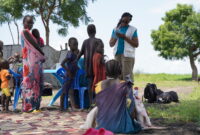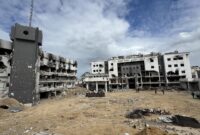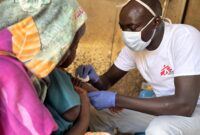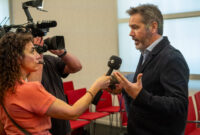Moria Camp: If the only way to break free is to burn your house, something is wrong
By Aurélie Ponthieu, Humanitarian Specialist for Doctors Without Borders/Médecins Sans Frontières (MSF)
Commenting on the fires that almost completely destroyed the Moria Center on Lesbos on September 9 and 10, Greek Government Spokesperson Stelios Petsas said in a press briefing: “They thought that if they set fire to Moria they would leave the island indiscriminately. Whatever those who set the fires had in mind, they can forget it.”
How these fires were started is still unconfirmed but what Mr Petsas implies, that refugees set the camp on fire to escape it provides a perfect illustration of the inhumane system still in place on Lesbos. When the only way to break free is to burn down your house, something might be very wrong, it should question the very nature of this place called “Moria”.
Those 12,000 people were already homeless. Except, those affected by the fire had no houses or homes, but shipping containers, shacks and tents, which they shared with more than 12,000 other asylum seekers in the most desperate conditions. Now they have been left to fend for themselves in the street, on the ashes of a camp they hate, where they were mistreated and will likely be told to return to.
Not the first fire at Moria
This is not the first time that Moria camp has been engulfed in flames. In September 2016, a fire destroyed the camp. At least 20 people suffered minor burns, while a woman and child with serious burns were evacuated to hospital in Athens. Thousands were left without shelter. Since then, other isolated fires have resulted in the deaths of three people.
The latest fire, however, did not start on Tuesday; it has been raging for years. It was fed by the pain inflicted by the EU’s migration control and deterrence agenda, and fanned by restrictions on people’s movements, by the dehumanizing food distribution queues, by the unfair and ever-changing asylum procedures, by a routine of humiliation, xenophobia and violence. By people’s crushed hopes for a better future – or at least for some dignity within Europe.
The despair felt by those in Moria has been growing ever since the EU-Turkey deal was adopted four years ago. The camp’s residents come and go. Fires and death left the “deal” unchallenged and labelled a success by European leaders. After months – and sometimes years – they are given a way out: to the Greek mainland, or back to Turkey, or back to their country of origin. They leave Lesbos sick, exhausted, often mentally ill and sometimes physically harmed. Then come new refugees to take their place and be crushed once again by the machine. Fires are no accidents in Moria, they are products of the migration deterrence machine.
When the COVID-19 pandemic was declared in Greece in March, MSF teams were concerned that an outbreak in Moria could become a public health disaster. In these overcrowded conditions, with limited access to soap and water, we feared the virus could spread like wildfire. Hundreds of people in the camp were medically at risk of falling severely ill should they contract COVID-19.
Along with other organizations, we called on the EU and Greek authorities to evacuate those people most at risk and to decongest the camp, which at the time was packed with 19,000 people. Hundreds of people were preventively transferred out of Moria. Still, 200 people in at-risk categories for COVID-19 were still living in Moria at the time of the fire.
Our team, together with the public health authorities, set up a dedicated triage and isolation centre to ensure that the first COVID-19 cases could be caught quickly. From May to July, we treated and safely isolated 55 patients with suspected coronavirus.
Yet in July we were forced to close the centre by local authorities, who cited administrative infractions related to urban planning. The closure of the centre left Moria’s residents with no COVID-specific response and left the local health system with no isolation capacity in case of an outbreak.
Since March, Covid-related curfews and increased restrictions on the movements of asylum seekers in Moria have been extended seven times for a period of over 150 days. When lockdown on Lesbos was lifted and the rest of the island’s population enjoyed their newfound freedoms, the residents of Moria were continuously deprived of any such liberty. Instead their confinement was made even stricter than before, while nothing was done to improve their living conditions or set up a comprehensive COVID-19 response. Moria’s residents had no chance to follow basic prevention measures, such as physical distancing or washing their hands. The message they were sent was clear: their health was less important than keeping the migration deterrence policy in place.
Politcizing COVID-19
To add insult to injury, the Greek government openly used the detection of the first COVID-19 case in August inside Moria to justify further restrictions on asylum seekers on the islands and to promote plans to set up detention centres.
Public health measures, when they restrict individual freedoms, should be proportionate, necessary and legal. They should also be based on scientific evidence. There is no evidence that detention and containment deter asylum seekers from leaving their countries of origin. Evidence, however, shows clearly that quarantine is ineffective and even counter-productive in overcrowded and insanitary conditions.
No disease outbreak can be successful controlled without the trust of communities. We know this to our cost from our experience working in other infectious diseases outbreaks. In February last year, the government-led Ebola response in Democratic Republic of Congo was politicized and met with suspicion and hostility from local people. As a result, our Ebola treatment centres in Katwa and Butembo were attacked, with the Katwa centre burned to the ground.
We have been urging the Greek health and migration authorities for weeks to set up an adequate COVID response plan for Moria: one that is based on outbreak control, and that counts on people’s collaboration and offers dignity to the sick and to those who might infect others. The Greek authorities failed to put such response in place, while the EU turned a blind eye and did nothing to solve the situation.
The ashes of Moria are a testament to the despair that has been manufactured by a state-sponsored system of deterrence, dehumanization and neglect. A similar system of inhumane detention must not be reborn from these ashes or there will always be chaos and despair at the EU’s borders.

